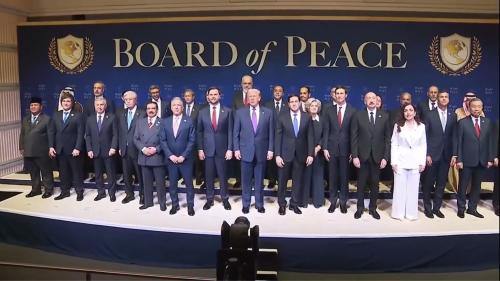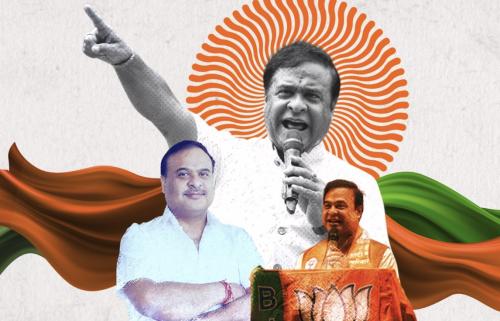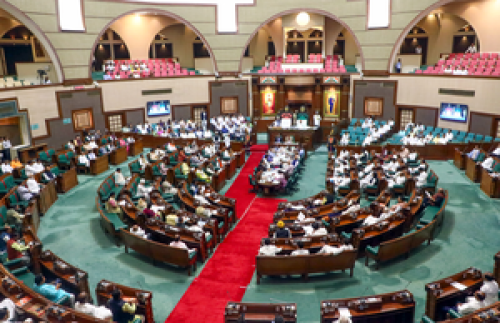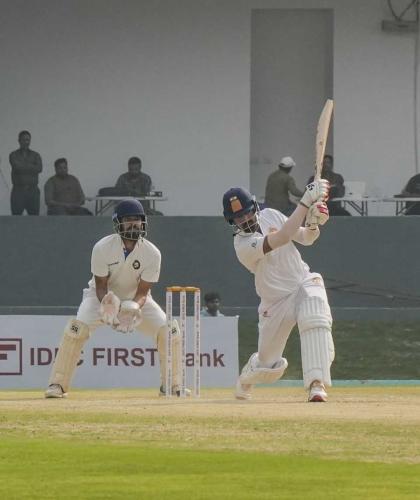By Shivaji Sengupta If ancient fabrics nod, and threat to fall, To patch their flaws, and buttress up the wall, Thus far ’tis duty: but here fix the mark; For all beyond it is to touch the ark. (John Dryden, Absalom and Achitophel. 1681.) India Tribune's decision to open a regular column called "The Culture of Politics," has probably never seemed more relevant than now, when the entire Republican Party seems to be developing deep cracks within, forcing public attention on the very culture of American power politics. The western definition of power is the ability to influence and control others. (The eastern perspective on power is to control oneself.) The 2020 presidential elections brought out among the Republicans a strange mixture of different Republican cultures crisscrossing its corridors of power. It has careened out of control, into a crisis brought about by that inimitable exponent of power at any cost, Donald J. Trump. He lost an election. But other Republican presidential candidates had also lost before. The Party took the losses, did some soul searching, analyzed its weak points, and prepared for the next one four years later. This time, however, thanks to its megalomaniac leader, the Republican Party was put under horrific stress because Trump refused to accept defeat. His self-hypnotic conviction that he had won a "landslide victory" over Joe Biden, persuaded huge swathes of his voters that the election was indeed rigged and stolen. This phenomenon is itself cultural. It is the culture of deep mistrust by the people in our country's two-hundred-and-fifty year's old political institutions. "If I cannot win, the system is at fault, it's out to get me. Throw it out." As the impeachment managers so efficiently and convincingly demonstrated, Trump single-handedly, and systematically, instigated millions of his supporters to "fight like hell...to stop the steal," and return him to the presidency. The climax came on January 6th, when over seven thousand of his extremist supporters stormed the Capitol as a joint session of Congress was in the act of formally declaring Joe Biden and Kamala Harris the next president and Vice President of the United States. The insurrectionists demanded a second term for Trump and inflicted not only physical damage to one of America's most hallowed buildings, but caused the deaths of five people and threatened to kill Nancy Pelosi because of her adversarial relationship with Donald Trump, and hang Vice President, Mike Pence, because the Vice President wouldn't nullify the results of the Electoral College disenfranchising over eighty million voters who preferred Biden to him. When the dust lifted from the chaos, Trump was impeached - again -and tried in the Senate. Democracy was the first casualty. And the Republican Party, once a party of Lincoln, was in shambles. It split three ways. The regular old fashioned GOP (the Grand Old Party) is still there, though barely breathing. It still believes in a small unobstrusive federal government, less regulations in business and production, and strictly opposes governmental deficits. Basically, Republicans of this type are institutionalists, the McConnels and the Romneys, the old fashioned grand old men who, for the Party's sake had been tolerating Trump. The second faction are "Trumpers," who have come to believe in him, because he had unexpectedly defeated Hillary Clinton in a thoroughly unconventional and offensive campaign. Trump's supporters secretly despised the intellectual elites of the GOP, and discovered in Trump, the sort of rambunctious, semi ignorant business tycoon that Americans love to admire. We might include Marjorie Taylor Greene in this mix, along with the likes of Jim Jordan and the new senator Tommy Tuberville. A third split is forming with the new presidential hopefuls. Two of them ran against him in the primaries of 2016, Marco Rubio and Ted Cruz. They are being joined by the likes of Josh Hawley who clearly want to be president, and who, in spite of all their loud support for Donald Trump, stand to gain most if the present trial succeeds in damaging him decisively. Beyond these three elements of the Republican Party are the extremist Republican supporters who invaded the Capitol. If Trump fades, as it seems likely after January 6th, these already disillusioned people will be looking for someone else to lead. This explains why an opportunist like Ted Cruz, despite his hatred for Trump (remember 2016?), why he is so loudly supporting him. Ditto, Josh Hawley. This, what may be emerging is a new culture of Republican politics. It seeks to attenuate the old-style institutionalism of Mitch McConnel and Mit Romney, and replace it with a populist party, nationalist in fervor and openly partial to whites. The older Republican culture believes in dialogue and debate; the new one, in diversion and divisiveness. While the former president may be at the crossroads of his own political fortune, Trumpism is a real force, with its own culture of conspiracies and violence. This new faction is waiting to see what happens in the impeachment trial. Donald Trump will not be convicted. That is a foregone conclusion. But what January 6th may have already done is brought the Republican elected officials an opportunity to test their colors. As "The Hill," a daily newspaper of Washington politics, put it: "Now, Republican senators are in the position of having to declare their hand about a former president who lost the White House, is widely believed to have contributed to the loss of the Senate, and stands accused of inciting a riot that placed their lives in danger — and yet remains formidably popular with the GOP base. How they vote will make visible deep fissures within the Republican Party that is still in the throes of grappling with Donald Trump's legacy, and with his magnetic hold on the Party's 40 million ardent supporters of Trump, many of them grassroots activists." Trump still enjoys 87% of the Republicans' confidence. 42% of American voters do NOT want him convicted in the Senate Trial, or banned from running again for president. However, his current appreciation rate is only 39%. Do you see the dilemma the Republican Party is in? In two years the midterm elections will be upon them. They need a well-oiled political machinery to wrest back the House and the Senate in both of which they are only narrowly in the minority. The Senate, in fact is 50-50 with Kamala Harris, the president of the Senate, having the tie-breaking vote. Usually, the president's party suffers electoral losses in the midterm. So, for the Republicans to win back the Senate, and even the House, would have been relatively easy. Instead, Ronna McDaniel, the Chair of the Republican National Party, is at sixes and sevens just trying to keep the Party together, never mind organizing for elections. Now Mich McConnel wants to ease out Donald Trump whom he thinks will be a liability to the Party in 2023; now Trump himself wants to leave and create his own "Patriot Party;" now, the extremists like Proud Boys threaten to tear down Republican institutions and galvanize around someone like Donald Trump Jr., if the father fades away. The interesting question is, how did it become like this? Ten years ago, a nationalist Right Wing Republican faction had threatened to break up the Republican Party, but a few expensive electoral losses put paid to that possibility. That was the Obama era. The Republicans won the House back in the midterm, and were chugging along nicely - until 2015. Then a funny thing happened on the way to the White House. Donald Trump came. Culturally speaking, it was a huge shock among traditional Republicans. In primary after primary, he campaigned in the most unconventional manner, out gunning sober, run-of-the-mill Republicans like Jeb Bush, out hustling the more brash ones like Marco Rubio and Ted Cruz. And as he did so, he began to attract the typically macho Americans who had been pushed back to poverty owing to their own self-willed, self-cultivated ignorance. Brought up with the daily diet of hating Blacks, resenting Hispanics who were willing to do the jobs they wouldn't do because they didn't pay enough, this population of cowboy farm workers heard Trump speak in a manner completely unlike an Obama, or a Mit Romney or a John McCain. A cocksure Trump crowned and cursed. He was crass about seducing women, spoke of their body parts using expletives, and was an instant hit among machos. Poor, but unwilling to admit defeat, they found their echo in Donald Trump. He spoke their language, spoke for them, and often took outlandish political positions against highly respected people. "George W. Bush was responsible for 9/11; Barak Obama was not born in America; John McCain was a loser," and so on. He shocked tradition, and sent the rude and rowdy cowboys in paroxysmal of delight. They were dirt poor; but he, Trump, was a billionaire. He was going to drive out the Hispanics, he was going to get them jobs, he will cow-tow to neither the Europeans, nor the Chinese. He will make America great again. This is the belief that Donald Trump sustained among millions of Americans. Will January 6th will be the end of him? Or will he reemerge like the proverbial jack in the box and lead them again in 2024? If he doesn't, will Trumpism continue, led by false Messiahs like Ted Cruz or Josh Hawley? Or will the institutionalists finally win out, and find fresh blood to lead them like Ronna McDaniel, Liz Chaney and Nicky Haley? We shall soon find out.
Republicans at crossroads: what will happen to the party after Trump?
- by Rinku
- February 21, 2021 2 minutes

U.S. President Donald Trump leaves the White House in Washington D.C. Dec. 18, 2019. The U.S. House of Representatives passed the impeachment against Donald Trump on Wednesday. (Xinhua/Liu Jie/IANS)
A franchise-based Global Chess League announced
February 22, 2021










